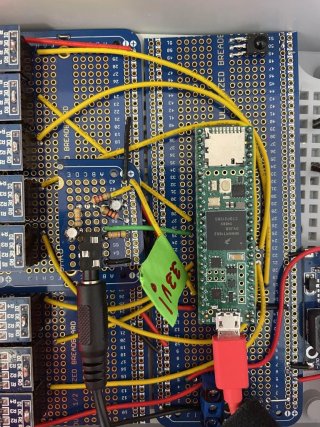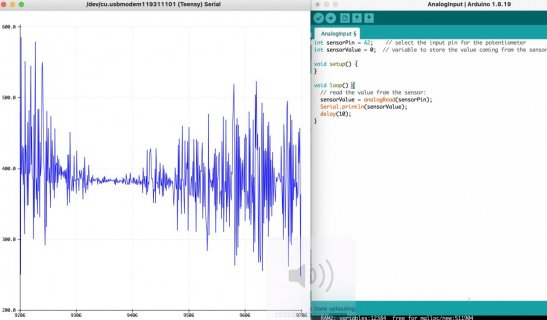Hi folks. First time trying the audio library. I'm using a teensy 4.1 without the shield, with the circuit illustrated here - I have replaced the 10k resistor with 2.2k as instructed. Here's my setup:

There's a little parallax in the image, but the green signal wire is connected to pin 16 on the teensy. There is foam tape insulating the bottom of my little audio input daughterboard. The other wiring is for Octows2811 but I'm not using it in this example.
I'm just trying to run any of the simple examples such as PeakMeterMono but I'm finding that the `available()` call on line 36 never returns true. Same for trying fft256 and fft1024 - available() is never true. If I just do a normal arduino analogRead from A2 and plot the result I can see a waveform that makes sense for the audio signal I'm delivering (see below). The DC offset on the signal line is about 1.2V.
Any ideas why `available()` isn't true? I searched the forum but only found an old thread about a clock speed issue that had been resolved by Paul.


There's a little parallax in the image, but the green signal wire is connected to pin 16 on the teensy. There is foam tape insulating the bottom of my little audio input daughterboard. The other wiring is for Octows2811 but I'm not using it in this example.
I'm just trying to run any of the simple examples such as PeakMeterMono but I'm finding that the `available()` call on line 36 never returns true. Same for trying fft256 and fft1024 - available() is never true. If I just do a normal arduino analogRead from A2 and plot the result I can see a waveform that makes sense for the audio signal I'm delivering (see below). The DC offset on the signal line is about 1.2V.
Any ideas why `available()` isn't true? I searched the forum but only found an old thread about a clock speed issue that had been resolved by Paul.


